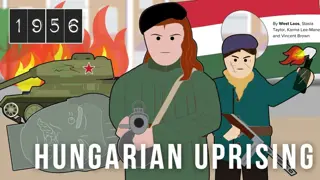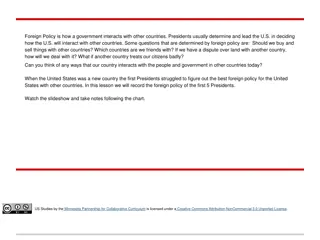The Continued Struggle and Foreign Support in the American Revolution
The American Revolution persisted with the support of allies like France and Spain, as well as key foreign figures such as Marquis de Lafayette and Friedrich von Steuben. Despite facing hardships like the harsh winter at Valley Forge and financial struggles, the Americans persevered with the aid of these allies. Life on the home front saw women and children taking on new responsibilities while Congress grappled with financial challenges.
Download Presentation

Please find below an Image/Link to download the presentation.
The content on the website is provided AS IS for your information and personal use only. It may not be sold, licensed, or shared on other websites without obtaining consent from the author. Download presentation by click this link. If you encounter any issues during the download, it is possible that the publisher has removed the file from their server.
E N D
Presentation Transcript
Chapter 6 Lesson 2 THE WAR CONTINUES
Gaining Allies Gaining Allies Benjamin Franklin: helped gain many allies for the U.S., France was secretly giving U.S. money Victory at Saratoga was a turning point in the American Revolution: France and Spain thought that the Americans might win now Feb. 1778: France declared war on Britain and sent money, troops, and equipment to aid Americans 1779: Spain declared war on Britain and Spanish troops fought British troops in Louisiana, Mississippi, Alabama, and Florida
Winter at Valley Forge Winter at Valley Forge Washington and his troops suffered a harsh winter in 1778 They lacked food, clothing, shelter, and medicine It was hard to keep the Continental Army together Many soldiers became sick and died Other men deserted (left without permission) and some officers quit In April 1778, Washington told his troops of the French help and this lifted everyone s spirits
Foreigners Help on the Battlefield Foreigners Help on the Battlefield Marquis de Lafayette French, worked for Washington without pay, a trusted aid to Washington, believed that the American cause was the future for humankind Thaddeus Kosciuszko and Casimir Pulaski Polish, helped build defenses Friedrich von Steuben Prussian, helped train Patriot troops at Valley Forge Juan de Miralles Spanish, helped persuade Spain, Cuba, and Mexico to send money to the United States Even with all this foreign helped, the Continental Army lacked one important thing: MONEY
Life on the Home Front Life on the Home Front War changed all lives, even those left behind Women had to take care of families by themselves, they had to run farms or businesses Children had to help their mothers and make do without a father in their lives Continental Congress had no power to raise money through taxes Congress started to print their own money This money quickly lost value: the amount of bills was greater than the amount of gold to back it up Congress stopped printing money, which meant no way to pay for the war
Life on the Home Front Life on the Home Front The American Revolution had many question what freedom really meant, was it meant for all? 1778, Governor William Livingston of new Jersey asked his government to free all enslaved people 1780: Pennsylvania adopted a plan to gradually free enslaved people- the first legislature in the world to take action against slavery Many northern states soon took steps to free slaves, but slavery would remain in the south for much longer

















































